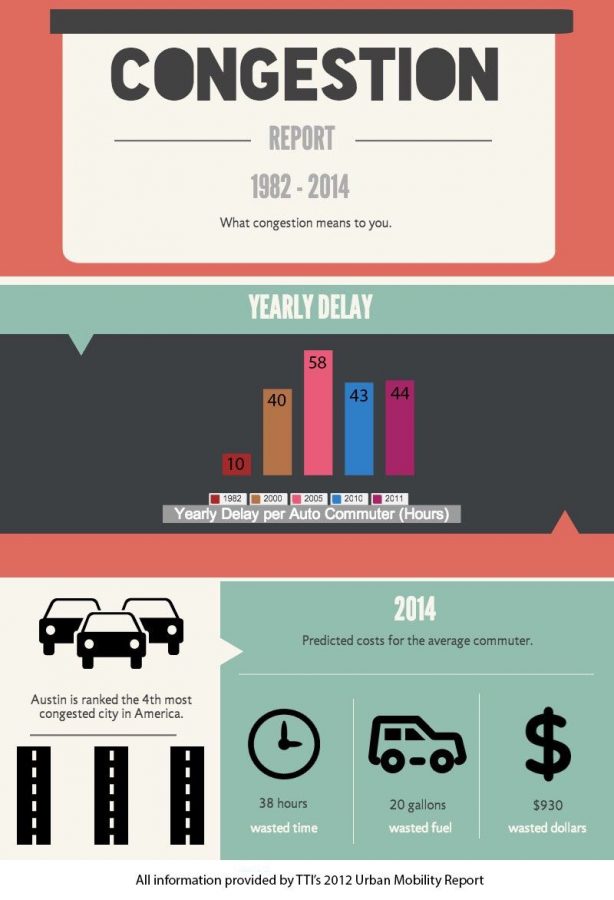Austinites seek congestion solutions after transit bond fails
Getting across town is taking longer than ever, according to Maria Minor, 21, a senior at St. Edward’s University and an Austinite who has depended on public transportation for the past eight years.
“I absolutely have to create my schedule based on when I can catch a bus,” she said.
A little over four decades ago, Austin had a population of about 250,000, a few quirky festivals and the self-proclaimed title as the “Live Music Capital of the World.”
Today, Austin is home to more than 860,000 people, and it’s constantly growing each day. INRIX, a global company that provides services relating to road traffic, ranks Austin as the fourth-most-congested city in America — with motorists spending an average of 38 hours each year in traffic.
Minor is feeling the pain.
“Depending on the route or how far I go, I have to set aside anywhere from 45 minutes to two hours to get from point A to point B,” Minor said.
Heavily congested traffic requires commuters like Minor to plan ahead for extra travel time. Several variables including construction, special events (music festivals), bad weather and accidents can make a trip take much longer than intended.
Minor takes this into account because she rides the Capital Metro buses to and from school and work every day. Travel times are often varied and unreliable.
“If I’m going across town, it usually takes longer. To get from my apartment on Riverside to St. Edward’s, it usually only takes about 30 minutes with a layover in the middle,” she said.
According to Texas A&M’s Transportation Institute’s (TTI) 2012 Urban Mobility Report, in 2011, congestion caused urban Americans to travel 5.5 billion extra hours and to purchase an extra 2.9 billion gallons of fuel. This adds up to a congestion cost of $121 billion.
The City of Austin is currently pursuing congestion reduction solutions. Proposition 1, a $1 billion congestion reduction strategy, planned to bring a light rail to central Austin. Austin voters, however, turned down the transportation bond by 56 percent.
“The bond would’ve used $600 million for a 9-mile rail line and $400 million for improving roads,” said Sara Behunek, public information specialist at the City of Austin.
In order to pay for the bond, taxes would increase by 6.25 cents spread out over five years. This would result in an estimated tax bill increase of $217 in 2020 on a home currently valued at $200,000.
Again, Austin voters have turned down this bond proposal. Taxes will not increase to support a new light rail.
Increased congestion, however, has a cost of its own.
New figures released by the Texas Department of Transportation (TxDOT) show that traffic congestion in the I-35 corridor costs the Austin economy around $196 million each year. It costs the commercial trucking industry another $72 million in lost transit time.
Several infrastructure projects are underway to address these issues. Austin’s 2014 Strategic Mobility Plan includes an expanded MetroRail late night and weekend service, a MoPac/Ben White interchange and the addition of MoPac express lanes.
Still, congestion relief isn’t coming quick enough for some Austinites, which has led them to come up with their own solutions to the problem.
Commuters like Kent Dyer, 47, want to see Austin aggressively address the situation.
He has a few ideas on how.
“I think encouraging businesses to move out of the downtown core would be helpful,” Dyer said. “I think more companies should encourage telecommuting and alternative work schedules. I think state of Texas employees and county employees should ride the bus for free like University of Texas and city employees do — I bet it will increase ridership.”
Austin has struggled with significant traffic congestion issues because of its rapid expansion.
City Demographer, Ryan Robinson, estimates that an average of 110 people move to Austin every day.
According to a 2009 Texas Transportation Institute report, traffic has grown more than 30 percent faster than the growth in road capacity in the Austin metro area over the past 25 years.
“I definitely think that if Austin wants to effectively accommodate the population growth we are experiencing, then we need to consider ways to improve infrastructure and public transit,” Minor said.
Austin will have a mayoral runoff on Dec. 16. Both candidates, Councilman Mike Martinez and civil rights attorney Steve Adler, have listed transportation as one of their main concerns.


